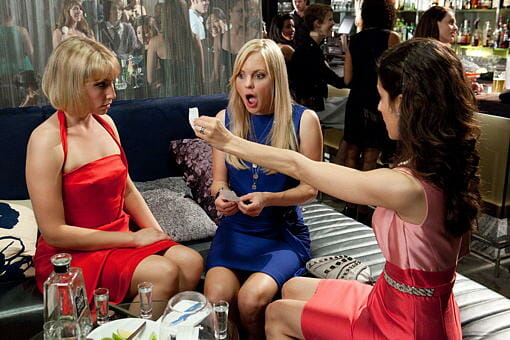By Sunny Choi · October 3, 2011

Like most mediocre romantic comedies, What’s Your Number skillfully attempts to sweep its aimless, dragging plot under the rug by sappily empowering the protagonist with a lesson about love and with one beautiful man at the very end. I’ll admit that I almost fell for it. As I stepped out of the theater, I was feeling the warm fuzzies all around. Just two hours after, I had to remind myself of the film by asking, “Wait, what did I just see?”
Although I have already seen these recycled formulas, I still found myself rooting for the protagonist because I like romantic comedies. Anna Faris plays the very lovable but romantically unfulfilled Ally Darling, who has slept with nineteen men, which is nearly twice as many guys the average woman has gone to bed with, according to Marie Claire magazine. Appalled by her social transgression, she decides to track down all her ex-boyfriends in an attempt to find “the one” and enlists the help of her resourceful neighbor, Colin (Chris Evans), a struggling musician who can’t keep it in his pants. Plus, she is fired from her marketing job. With everyone else either getting married or staying relatively chaste (compared to her), she begins to feel like a failure.
The film encompasses all the elements of a conventional chick flick, including the younger sister’s wedding, the main couple’s awkward transition from friends to lovers, the domineering mother (Blythe Danner), and the creepy boss (Joel McHale). Like many other chick flicks, it satirizes the emergent species of the desperate woman in her thirties who drinks too much and tailors her dress and hobbies (both leisurely and sexual) to match those of her boyfriends. Eventually, these guys lose interest in her parroting repertoire. Now that I think about it, the fact that Ally lost her virginity to a geeky puppeteer (Andy Samberg) is quite significant–she willingly offers herself as a puppet to her boyfriends.
However, the film also dragged on for longer than necessary, partly because it couldn’t decide on its direction. So, it chose to chronicle Ally’s encounters with her past sexual conquests. Although some of Ally’s former conquests are entertaining, we often find ourselves laboriously checking off these series of disappointments. Creepy gynecologist (Thomas Lennon) who recognizes her by her vagina, check. Classy British divorcé (Martin Freeman), check. While these cameos were probably meant to keep the audience engaged, it got a little tiresome, especially since these encounters were all so predictably cringeworthy. However, I truly felt for Ally when her politician ex (Anthony Mackie) asks her to marry him so that he can conceal his homosexuality and secure his candidacy for president. Moments like these reinforce the protagonist’s serious flaw, that she’s always opening herself to manipulation by men.
Not to mention that the film contained an excessive amount of commercial advertisements. I saw at least ten iPhones, an iPod, an explicit advertisement of Ann Taylor pantsuits, and Apple desktop computer and laptop in the movie. While I realize that the newest formula for a romantic comedy involves the fanciest gizmos to illustrate the web of miscommunication and misunderstandings (does everyone remember the Bible app scene in Friends with Benefits?), the film could have utilized a more nuanced approach to promote its sponsors.
Faris’ and Evans’ characters also lacked chemistry, perhaps because their characters are so lopsided in terms of development. While Faris charms audiences with her comic timing and likability, Evans (who is often shirtless) really only serves as the eye candy. Even when Colin and Ally bond over multiple take-out boxes and alcohol, four times of this uninspired banter and meal was more than enough. Apparently, the filmmakers also noticed their poor chemistry, so they crammed a scene during which Ally and Colin play stripper horse (a sexualized version of the middle school basketball game). As if that wasn’t enough to consolidate their love line, they immediately go skinny-dipping in the Boston harbor. One of these two scenes would have been more than sufficient, but Hollywood decided to underestimate the attention span and comprehension skills of its audience.
At the end, the film tries to redeem itself by pitching a lesson. Ally realizes that being in love means being yourself, and she refuses to settle as a trophy wife to appease her demanding mother. She embraces her identity as a “jobless whore who has slept with twenty guys” and steals a compact car and pizza delivery bike to run across town to pursue her man. And of course, the film predictably celebrates their love with a Natasha Bedingfield-esque song. What I’ve realized is that romantic comedies often utilize hopeful, over-sentimental endings to overcompensate for its formulaic characters and plot. Only then, will viewers leave the theater feeling all mushily happy and choose to ignore the movie’s serious flaws.